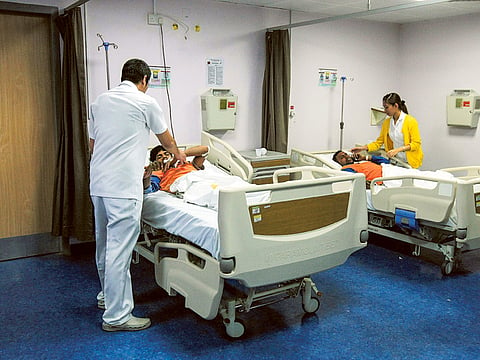Dubai’s smaller clinics seek value creation
Smaller clinics are joining forces or being acquired to better handle changes

Dubai: With the country’s health care sector going through far-reaching change, many of the smaller clinics in Dubai and the other emirate see value in joining forces than try and to compete on their own. By coming together, these entities also see the prospect of being better prepared to tap opportunities within the compulsory medical insurance regime rolled out in Dubai.
“As more residents of Dubai come under mandatory medical cover and its single-window clearance, they no longer have to be that concerned about affordability in sourcing these services,” said Wilson T.J., Group Director at Aster DM Healthcare. “They find they will no longer have to rely on the small clinic — more often than not with a single doctor or two and limited diagnostic capability — for the bare minimum consultancy.”
Under the new insurance regime, having a win-win understanding with insurers becomes all the more vital for health care providers, and more so for the smaller entities. This has been a prompt for the current consolidation moves afoot.
“This is to ensure a bulk bargaining power and also to negotiate an exclusive network business with the insurance companies and, later, business assurance if they move to the next level,” said Jayakrishnan Veetil, Insurance Manager at Canadian Specialist Hospital. “Inflation too plays a role in this and this cannot be denied.
“Competition is growing and many players are looking for more “feeder centres” to pool patients to meeting their business targets. More than health care cost, future business potential is adding momentum to more investments for this sector.”
Older neighbourhoods
Also, recently, some of the large and even mid-sized health care networks in the country have been making offers to smaller practitioners and, if they agree to the deal, incorporate them into their networks. Such transactions serve a purpose; most of the smaller clinics had been serving the city’s older neighbourhoods they were a part of for a long time. By buying or partnering with them, the larger networks get access to a new base of potential patients, who could also be future customers at their larger facilities.
Private funds specialised in health care-related investments are also getting active in snapping up smaller or mid-tier facilities and creating network possibilities out of them. “Private equity or venture capital firms do so because of the reliability of this sector,” said Veetil. “They see the huge and diversified business potential in this. There has been further momentum as existing players have speeded up their expansion plans as well.”
It an age-old theme that health care is one industry — education is the other — where the forces of business cycles do not leave much of an impact. Through the recent downturn, industry players maintained the tempo of building up new capacities, not just at the middle and top end of the health care spectrum but at the primary level to.
Expansion
Aster DM Healthcare, for instance, plans to raise the number of its “Access” branded primary centres to 20 by next year compared with the eight now.
“In the past we had acquired a few independent medical centres, but it was difficult to integrate their management with out network,” said Wilson. “Currently, our focus with acquisitions is on pharmacies and for primary clinics we will build our own.
“The entire market dynamic is changing and will change further when full-scale compulsory medical turns into reality for Dubai.”



